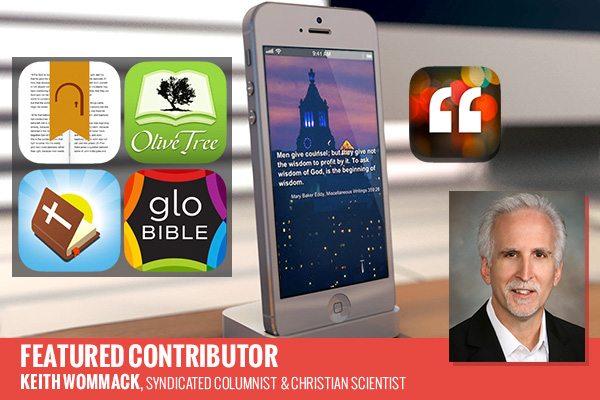
Top 5 Bible Apps to Heal Your Mind and Body
- By Keith Wommack --
- 07 May 2014 --

Featured Contributor Keith Wommack describes his top Bible apps for the mind and body.
Do you want to control your own health care? If so, you’re not alone. A societal shift to a more patient-centered, empowered care is taking place.
Influential game changers in this adjustment, allowing people to play a more active role in their health care, are computer tablets and smart phones, as health apps are being downloaded daily.
Health apps can count your steps, carbohydrates, and calories. They can track your diet and heart rate, as well as log your nutrition. One app even attempts to shame you with a snarky voice when you gain weight instead of lose it.
However, if you really desire added control over your health, you might consider a few Bible apps.
Yes, Bible apps. Studies show prayer and spirituality benefit both mind and body.
Whether you utilize spirituality when medical treatment cannot reach you quickly or as a first choice for health care, Bible apps are invaluable.
I’ve found 5 Bible apps helpful:
- Bible Gateway – Offers the choice of scriptural texts in 34 different translations, as well as the ability listen to the Bible.
- GoVerse – Includes inspirational quotes from the Bible and Mary Baker Eddy’s writings under everyday topics such as: Body, Confidence, Crisis, Depression, Health, Relationships, Success. You can share quotes by text, email, Twitter, and Facebook. (Mary Baker Eddy is the author of the best-selling spiritual guidebook Science and Health with Key to the Scriptures)
- Bible+ – This Olive Tree app enables you to build a robust reference library of Bible versions, dictionaries, and commentaries.
- Daily Bible Inspirations – This app simply shares Bible texts on picturesque backgrounds.
- Glo Bible – Provides five main lenses to learn about the Bible: Bible texts, an atlas, a timeline, biblical pictorials, and topical studies.
The experiences of many show these apps to be beneficial as Bible verses can be pain-busters and healers.
For example: One evening, a woman called me. Earlier that day, she’d swept up pieces of glass from a broken window. Without knowing, tiny glass fragments had blown into her eyes. Hours later, she was in extreme pain.
She wanted my help. I opened the Bible and read the Beatitudes to her. Jesus opened the Sermon on the Mount with these guiding principles.
As I read, I could hear moaning. However, when I reached the end of the verses, the woman’s pain had lessened.
Then I started over. Reading through them a second time, I felt a sense of peace and a deep certainty that health was present. Through experience, I’ve learned that these are mental signs of healing taking place.
When I finished the second reading, her pain was completely gone. The woman was free.
Scriptural verses quiet thought and reduce stress. They empower the reader to let go of fear and pain. Perhaps, this is the ultimate of patient-centered care, patients in control of their health.
Yes, there are apps that enable you to take a more active role in your health care. Give them a try. You might be pleasantly surprised.


















